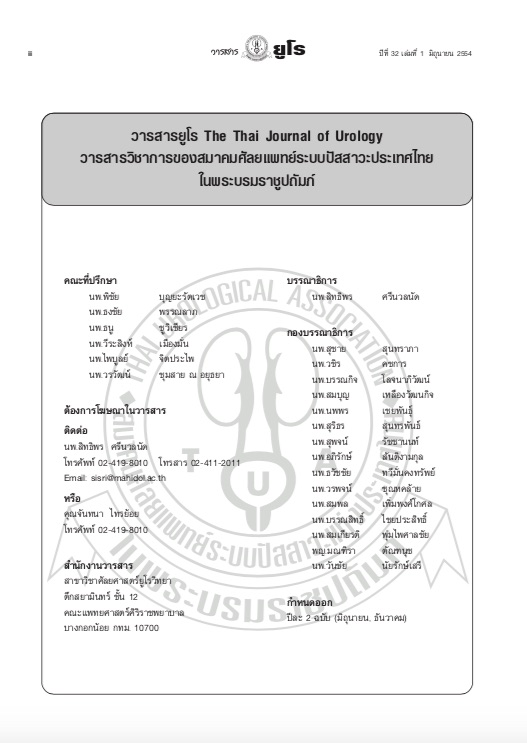Immediate vs Delayed Voltage Escalation during Extracorporeal Shock Wave Lithotripsy (ESWL) in Urinary Calculi: Does it effect out- come?, a Randomized controlled trial
Keywords:
Immediate, Delayed, Voltage Escalation, Extracorporeal Shock Wave Lithotripsy, Urinary Calculi, ESWLAbstract
Introduction: Preliminary data have suggested that delaying voltage escalation for SWL might both improve fragmentation and minimize renal injury. No consensus has been reached regarding the optimal treatment protocols for SWL.
Objective: To investigate a randomized trial of ESWL efficacy by immediate vs delayed voltage escalation during shockwave lithotripsy (SWL) consist the consumption level of the electrode, and the rate of shock wave administration.
Methods: A total of 119 patients with urinary calculi were randomized to undergo immediate vs delayed voltage escalation SWL. Success was defined as an asymptomatic patient who was stone free or had adequate fragmentation (sand or fragments < 4 mm) at 4 weeks after treatment.
Results: Of the 119 patients, 59 were treated with immediate voltage escalation SWL and 60 patients with delayed escalation. The groups were similar in sex, stone area, and stone location. The overall success rate at 4 weeks was 50.8% for immediate vs 58.3% for delayed SWL (P = .412). No differences were seen in the complications between the 2 treatments.
Conclusions: A trend was also seen for delayed voltage escalation to be less energy in the treatment of urinary calculi compared with calculi with immediate voltage escalation (~ 10%, when Patients had been delivered to 6,000 shocks). We suggest that the patients in delayed group had more total shocks and less total energy should implied less kidney injury.
References
Coz F, Orvieto M, Bustos M, Lyng R, Stein C, Hinrichs A, et al. Extracorporeal shock wave lithotripsy of 2000 urinary calculi with the Modulith SWL-20: success and failure according to size and location of stones. J Endourol 2000; 14: 239-46.
Talic RF, El Faqih SR. Exracorporeal shockwave lithotripsy for lower pole nephrolithiasis: efficacy and variables that influence treatment outcome. Urology 1998; 51: 544-7.
Razvi HA, Denstedt JD, Chun SS, Sales JL. Intracorporeal lithotripsy with the holium:YAG laser. J Urol 1996; 156: 912-4.
Mobley TB, Myers DA, Grine WB, Jenkins JM, Jordan WR. Low energy lithotripsy with the Lithostar: treatment results with 19,962 renal and ureteral calculi. J Urol 1993; 149: 1419-24.
Sarica K, Iikay L, Kiliç S, Koar A, Yaman O, Müftüolu YZ, et al. Stone disintegration: effect of shock wave projection and electrode age on this parameter in a standard stone model. Int Urol Nephrol 1997; 29: 281-6.
Vallancien G, Munoz R, Borghi M, Veillon B, Brisset JM, Daudon M. Relationship between the frequency of piezoelectric shock waves and the quality of renal stone fragmentation: in vitro study and clinical implication. Eur Urol 1989; 16: 41-4.
Pace KT, Ghiculete D, Harju M, Honey RJ. Shock wave lithotripsy at 60 or 120 shocks per minute: a randomized, double-blind trial. J Urol 2004; 174: 595-9.
Zhou Y, Cocks FH, Preminger GM, Zhong P. The effect of treatment strategy on stone comminution efficiency in shock wave lithotripsy. J Urol 2004; 172: 349-54.
Maloney ME, Marguet CG, Zhou Y, et al. Progressive increase in lithotriptor output produces better in-vivo stone comminution. J Endourol 2006; 20: 603-6.
Willis LR, Evan AP, Connors BA, Handa RK, Blomgren PM, Lingeman JE. Prevention of lithotripsyinduced renal injury by pretreating kidneys with low-energy shock waves. J Am Soc Nephrol 2006; 17: 663-73.
Honey RJ, Ray AA, Ghiculete D, Pace KT. Shock Wave Lithotripsy: A Randomized, Double-blind Trial to Compare Immediate Versus Delayed Voltage Escalation. Urology 2010; 75: 38-44.



